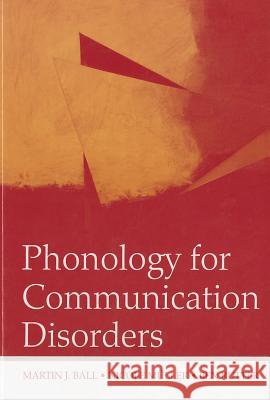Phonology for Communication Disorders » książka
Phonology for Communication Disorders
ISBN-13: 9780805857610 / Angielski / Twarda / 2009 / 275 str.
Phonology for Communication Disorders
ISBN-13: 9780805857610 / Angielski / Twarda / 2009 / 275 str.
(netto: 718,58 VAT: 5%)
Najniższa cena z 30 dni: 654,86
ok. 16-18 dni roboczych.
Darmowa dostawa!
This textbook describes the approaches to phonology that are most relevant to communication disorders. It examines schools of thought in theoretical phonology, and their relevance to description, explanation and remediation in the clinical context. A recurring theme throughout the book is the distinction between phonological theories that attempt elegant, parsimonious descriptions of phonological data, and those that attempt to provide a psycholinguistic model of speech production and perception. This book introduces all the relevant areas of phonology to the students and practitioners of speech-language pathology and is a companion volume to the authors' Phonetics for Communication Disorders.
This book is a companion volume to the authors’ Phonetics for Communication Disorders; and, just as that text aimed to introduce all the relevant areas of phonetics to the student and practitioner of speech-language pathology, so this book aims to describe those approaches to phonology that the authors have deemed most relevant to communication disorders. The book examines schools of thought in theoretical phonology, and their relevance to description, explanation and remediation in the clinical context.
A recurring theme throughout the book is the distinction between phonological theories that attempt elegant, parsimonious descriptions of phonological data, and those that attempt to provide a psycholinguistic model of speech production and perception. Clearly, if we are confronted with speech data from a highly unintelligible client, then an analysis that sorts the data into clear patterns will be extremely useful. Such an analysis may not explain why such patterns arose, or how best to remediate them. Analyses derived from more phonetically concrete or psycholinguistically valid phonologies may well provide just that extra information.











